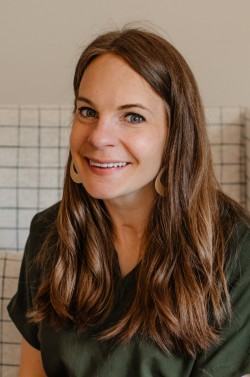Laura Morgan

As the Christmas 2012 holiday approached, I was juggling my clinical fellowship in Speech-Language Pathology, along with commitments with my church, hobbies of running and playing several instruments. On Dec. 19th, 2012, I was a buckled passenger on the way to my grandmother’s funeral. A momentary lapse of attention caused the vehicle I was in to drift off the interstate and slam into a parked 18-wheeler semi vehicle. By providential coincidence, medical professionals happened to come across the accident site on the interstate soon after it had occurred. By immediate intervention at a local hospital, everyone, remarkably, survived. I was the most injured, having sustained a Moderate-Severe Diffuse Axonal Traumatic Brain Injury (TBI) and broken bones, including Cervical Spinal Vertebrae 1 and 2. After ninety-two days inpatient, none of which I remember, I was discharged home in a wheelchair. This was a phase in which I grieved the uncertainties of ever returning to work as a Speech Pathologist, running, playing cello, banjo, etc. Due to my severely impacted short-term memory, I was in perpetual state of grief, needing to re-discover losses every time I awoke from my frequent naps. I found that my grieving increased as my cognitive abilities returned, so started referring to this dichotomy as “the double-edged sword of cognitive progress”.
While I dedicated myself to my rehabilitation, I volunteered hundreds of hours in several speech pathology departments. Inspired by my first-hand experience of being on the other side of the speech pathology table, I started giving presentations to medical facilities and graduate speech pathology programs. I was devastated by the decision of the national speech pathology association not to extend the 2-year deadline for completing my clinical fellowship that had been interrupted by the accident. The board’s decision meant I had to re-take the national certifying praxis exam and repeat the clinical fellowship, all while navigating life with a recently acquired TBI.
Joining the community of brain injury survivors, who are frequently referred to simply as “Survivors” given the devastating statistics, I struggled with the collection of cognitive skills of executive functions. When explaining executive dysfunction to brain injury survivors and their care partners, I often describe it as being all the skills necessary to plan, host, then afterwards analyze the success of a large dinner party. Skills of executive function include planning, sequencing, selective, sustained and divided attention, memory and problem solving, among other abilities. While I will always experience effects of my brain injury, I choose to view them with a growth mindset, something I’m always encouraging in other survivors. Rather than taking a fixed mindset about challenges, such as “I’ll never be able to do this activity again”, I encourage a growth mindset by discovering compensatory strategies to enable activity completion despite disability.
Because of the challenges I have experienced as a Survivor, I am uniquely equipped to support, empathize with and educate.
